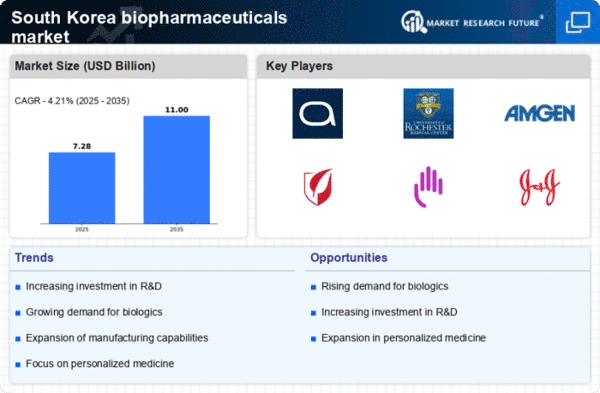Rising Focus on Biosimilars
The biopharmaceuticals market in South Korea is witnessing a rising focus on biosimilars, which are biologic medical products highly similar to already approved reference products. The increasing cost of biologic therapies has prompted healthcare providers to seek more affordable alternatives, thereby driving the demand for biosimilars. By 2025, the biosimilars segment is expected to account for approximately 25% of the total biopharmaceuticals market revenue. This shift not only enhances patient access to essential medications but also fosters competition among manufacturers, potentially leading to lower prices. As regulatory pathways for biosimilars become more streamlined, the market is likely to see an influx of new products, further bolstering growth.
Government Support and Funding Initiatives
The South Korean government is actively supporting the biopharmaceuticals market through various funding initiatives and policy frameworks. In recent years, substantial investments have been made to foster innovation and research in biotechnology. The government aims to increase the biopharmaceuticals market's contribution to the national economy, targeting a growth rate of 10% annually. Initiatives such as tax incentives for R&D and grants for startups are designed to stimulate growth and attract foreign investment. This supportive environment is likely to enhance the overall competitiveness of the biopharmaceuticals market, encouraging both domestic and international players to invest in South Korea.
Increasing Demand for Innovative Therapies
The biopharmaceuticals market in South Korea is experiencing a notable surge in demand for innovative therapies. This trend is driven by a growing prevalence of chronic diseases and an aging population, which necessitates advanced treatment options. In 2025, the market is projected to reach approximately $10 billion, reflecting a compound annual growth rate (CAGR) of around 8%. The increasing focus on research and development within the biopharmaceutical sector is likely to yield novel therapies that address unmet medical needs. As healthcare providers and patients alike seek more effective treatment modalities, the biopharmaceuticals market is poised for substantial growth, driven by the introduction of cutting-edge therapies that enhance patient outcomes.
Collaboration Between Academia and Industry
Collaboration between academic institutions and the biopharmaceuticals market is becoming increasingly prevalent in South Korea. These partnerships facilitate the translation of research findings into practical applications, accelerating the development of new therapies. Universities and research institutes are often at the forefront of biopharmaceutical innovation, providing valuable insights and expertise. In 2025, it is anticipated that collaborative projects will contribute to over 20% of the new product pipeline in the biopharmaceuticals market. This synergy not only enhances the research capabilities of companies but also fosters a culture of innovation, positioning South Korea as a leader in biopharmaceutical research and development.
Advancements in Biomanufacturing Technologies
Technological advancements in biomanufacturing are significantly impacting the biopharmaceuticals market in South Korea. Innovations such as continuous manufacturing and single-use technologies are streamlining production processes, thereby reducing costs and improving efficiency. These advancements enable companies to scale up production while maintaining high-quality standards. In 2025, it is estimated that biomanufacturing technologies will account for over 30% of the total production capacity in the biopharmaceuticals market. This shift not only enhances the competitiveness of South Korean firms but also positions them favorably in the international market. As these technologies evolve, they are expected to facilitate the rapid development and commercialization of new biopharmaceutical products.



















Leave a Comment